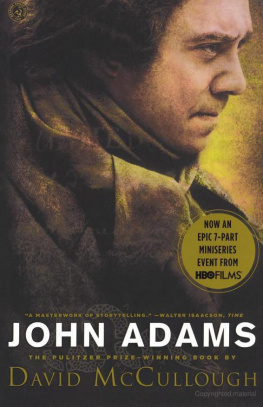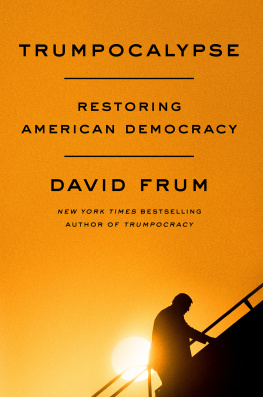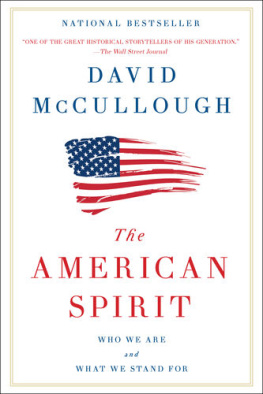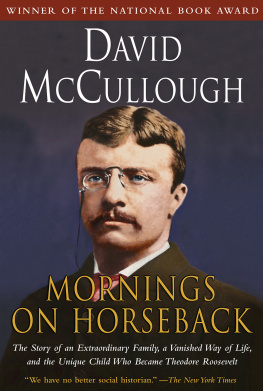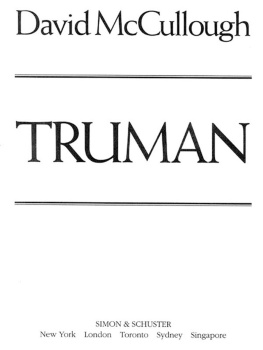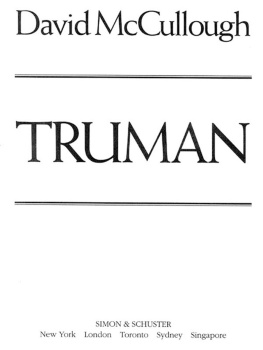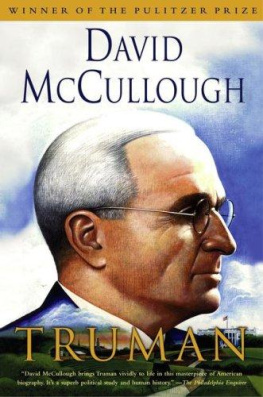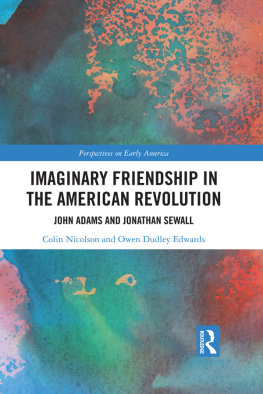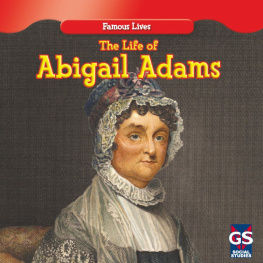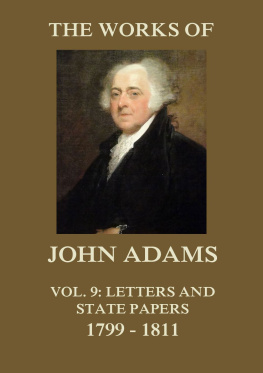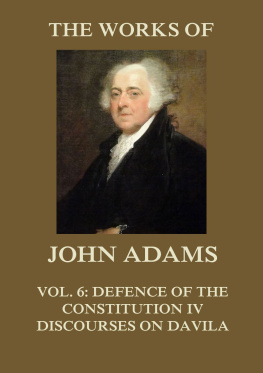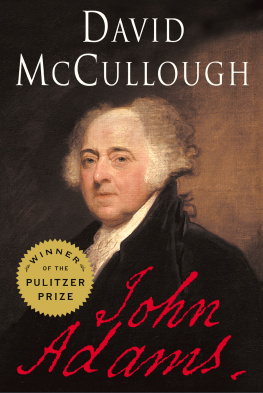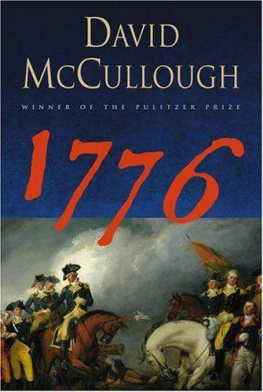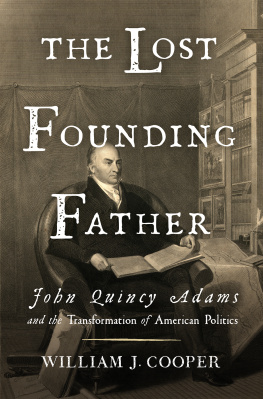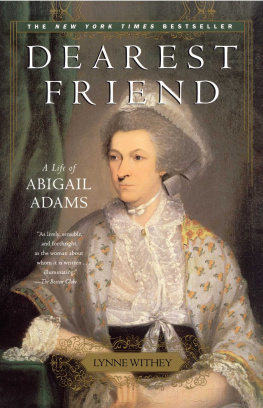John Adams
by
David McCullough
Contents
We live, my dear soul, in an age of trial. What will be the consequence, I know not. John Adams to Abigail Adams, 1774
Part I
Revolution
But what do we mean by the American Revolution? Do we mean the American war? The Revolution was effected before the war commenced. The Revolution was in the minds and hearts of the people. John Adams I have heard of one Mr. Adams but who is the other? King George III
Chapter One
The Road to Philadelphia
You cannot be, I know, nor do I wish to see you, an inactive spectator. We have too many high sounding words, and too few actions that correspond with them. Abigail Adams
I N THE COLD, nearly colorless light of a New England winter, two men on horseback traveled the coast road below Boston, heading north. A foot or more of snow covered the landscape, the remnants of a Christmas storm that had blanketed Massachusetts from one end of the province to the other. Beneath the snow, after weeks of severe cold, the ground was frozen solid to a depth of two feet. Packed ice in the road, ruts as hard as iron, made the going hazardous, and the riders, mindful of the horses, kept at a walk.
Nothing about the harsh landscape differed from other winters. Nor was there anything to distinguish the two riders, no signs of rank or title, no liveried retinue bringing up the rear. It might have been any year and they could have been anybody braving the weather for any number of reasons. Dressed as they were in heavy cloaks, their hats pulled low against the wind, they were barely distinguishable even from each other, except that the older, stouter of the two did most of the talking.
He was John Adams of Braintree and he loved to talk. He was a known talker. There were some, even among his admirers, who wished he talked less. He himself wished he talked less, and he had particular regard for those, like General Washington, who somehow managed great reserve under almost any circumstance.
John Adams was a lawyer and a farmer, a graduate of Harvard College, the husband of Abigail Smith Adams, the father of four children. He was forty years old and he was a revolutionary.
Dismounted, he stood five feet seven or eight inches tallabout middle size in that dayand though verging on portly, he had a straight-up, square-shouldered stance and was, in fact, surprisingly fit and solid. His hands were the hands of a man accustomed to pruning his own trees, cutting his own hay, and splitting his own firewood.
In such bitter cold of winter, the pink of his round, clean-shaven, very English face would all but glow, and if he were hatless or without a wig, his high forehead and thinning hairline made the whole of the face look rounder still. The hair, light brown in color, was full about the ears. The chin was firm, the nose sharp, almost birdlike. But it was the dark, perfectly arched brows and keen blue eyes that gave the face its vitality. Years afterward, recalling this juncture in his life, he would describe himself as looking rather like a short, thick Archbishop of Canterbury.
As befitting a studious lawyer from Braintree, Adams was a plain dressing man. His oft-stated pleasures were his family, his farm, his books and writing table, a convivial pipe and cup of coffee (now that tea was no longer acceptable), or preferably a glass of good Madeira.
In the warm seasons he relished long walks and time alone on horseback. Such exercise, he believed, roused the animal spirits and dispersed melancholy. He loved the open meadows of home, the old acquaintances of rock ledges and breezes from the sea. From his doorstep to the water's edge was approximately a mile.
He was a man who cared deeply for his friends, who, with few exceptions, were to be his friends for life, and in some instances despite severe strains. And to no one was he more devoted than to his wife, Abigail. She was his Dearest Friend, as he addressed her in lettershis best, dearest, worthiest, wisest friend in the worldwhile to her he was the tenderest of husbands, her good man.
John Adams was also, as many could attest, a great-hearted, persevering man of uncommon ability and force. He had a brilliant mind. He was honest and everyone knew it. Emphatically independent by nature, hardworking, frugalall traits in the New England traditionhe was anything but cold or laconic as supposedly New Englanders were. He could be high-spirited and affectionate, vain, cranky, impetuous, self-absorbed, and fiercely stubborn; passionate, quick to anger, and all-forgiving; generous and entertaining. He was blessed with great courage and good humor, yet subject to spells of despair, and especially when separated from his family or during periods of prolonged inactivity.
Ambitious to excelto make himself knownhe had nonetheless recognized at an early stage that happiness came not from fame and fortune, and all such things, but from an habitual contempt of them, as he wrote. He prized the Roman ideal of honor, and in this, as in much else, he and Abigail were in perfect accord. Fame without honor, in her view, would be like a faint meteor gliding through the sky, shedding only transient light.
As his family and friends knew, Adams was both a devout Christian and an independent thinker, and he saw no conflict in that. He was hard-headed and a man of sensibility, a close observer of human folly as displayed in everyday life and fired by an inexhaustible love of books and scholarly reflection. He read Cicero, Tacitus, and others of his Roman heroes in Latin, and Plato and Thucydides in the original Greek, which he considered the supreme language. But in his need to fathom the labyrinth of human nature, as he said, he was drawn to Shakespeare and Swift, and likely to carry Cervantes or a volume of English poetry with him on his journeys. You will never be alone with a poet in your pocket, he would tell his son Johnny.
John Adams was not a man of the world. He enjoyed no social standing. He was an awkward dancer and poor at cards. He never learned to flatter. He owned no ships or glass factory as did Colonel Josiah Quincy, Braintree's leading citizen. There was no money in his background, no Adams fortune or elegant Adams homestead like the Boston mansion of John Hancock.
It was in the courtrooms of Massachusetts and on the printed page, principally in the newspapers of Boston, that Adams had distinguished himself. Years of riding the court circuit and his brilliance before the bar had brought him wide recognition and respect. And of greater consequence in recent years had been his spirited determination and eloquence in the cause of American rights and liberties.
That he relished the sharp conflict and theater of the courtroom, that he loved the esteem that came with public life, no less than he loved my farm, my family and goose quill, there is no doubt, however frequently he protested to the contrary. His desire for distinction was too great. Patriotism burned in him like a blue flame. I have a zeal at my heart for my country and her friends which I cannot smother or conceal, he told Abigail, warning that it could mean privation and unhappiness for his family unless regulated by cooler judgment than his own.
In less than a year's time, as a delegate to the Continental Congress at Philadelphia, he had emerged as one of the most sensible and forcible figures in the whole patriot cause, the Great and Common Cause, his influence exceeding even that of his better-known kinsman, the ardent Boston patriot Samuel Adams.
He was a second cousin of Samuel Adams, but possessed of another species of character, as his Philadelphia friend Benjamin Rush would explain. He saw the whole of a subject at a glance, and... was equally fearless of men and of the consequences of a bold assertion of his opinion.... He was a stranger to dissimulation.
Next page
